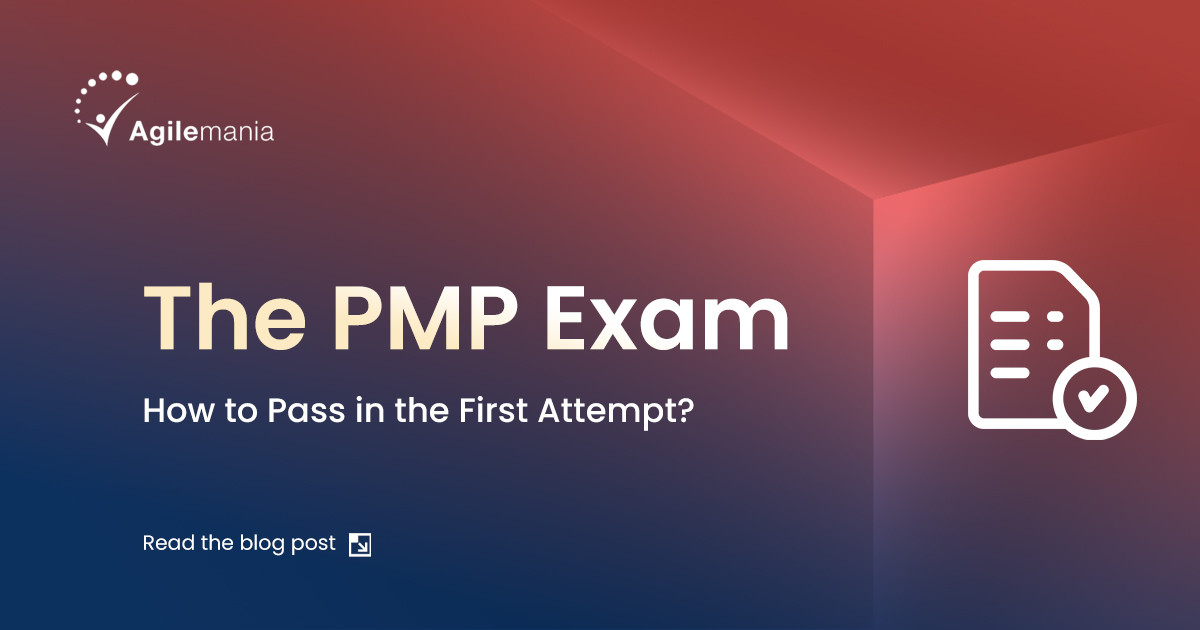
Satyajit Gantayat
Satyajit has broad and deep experience in Agile coaching at the strategic senior executive level wh... Read more
![]() Get Your AI-Enabled Scrum Master Certification for Just ₹2,500 (Save 75%)!
Get Your AI-Enabled Scrum Master Certification for Just ₹2,500 (Save 75%)!
Scrum.Org
SAFe®
ICAgile
Scrum Alliance
Technical Agility
Kanban
Business Analysis
Project Management
AI-Enabled
Agilemania Academy
Scrum.Org
SAFe®
ICAgile
Scrum Alliance
Technical Agility
Kanban
Business Analysis
Project Management
AI-Enabled

Satyajit Gantayat
Satyajit has broad and deep experience in Agile coaching at the strategic senior executive level wh... Read more

Congratulations!
You’ve embarked on a journey toward achieving the prestigious Project Management Professional (PMP) certification.
Whether you’re a skilled project manager or new to the field, passing the PMP exam on your first attempt is a significant milestone.
Let’s not underestimate the task at hand. Passing the PMP exam on your first try is a formidable feat that will propel your career to new heights. It's a challenge, but one that's well worth the effort.
The PMP (Project Management Professional) certification is well-respected and shows that you have the skills and knowledge to manage projects successfully.
But, like any important exam, preparing for the PMP can be challenging. It covers many topics and requires a solid understanding of project management principles.
In this blog, we will explain everything you need to know to pass the PMP exam on your first attempt.
We understand that preparing for such a comprehensive exam can be daunting, especially when balancing work, family, and other commitments. Rest assured, we're here to provide you with the guidance and support you need to succeed at every step of the way.
We'll break down the exam content stepwise, explain what to expect, and share tips and strategies to make your preparation easier and more effective.
Create a study plan that fits your schedule and commit to it. A study plan is essentially a detailed outline of how you will prepare for the PMP exam, focusing on the PMI® standards. Approach it as a project—you are the project manager!
Your study plan acts as a roadmap, guiding you through your preparation so you don't feel lost or overwhelmed. Before you begin studying, it's crucial to set clear objectives and outline how you'll meet them.
Here's an example of a study plan:
Dedicate 60-90 minutes to reading sections from A Guide to the Project Management Body of Knowledge (PMBOK® Guide).
Take a mock exam from the Agilemania website (available only once you enroll for the training).
Spend 90 minutes working on practice questions from the Q&A section on the Agilemania website (available only once you enroll for the training), focusing on areas for improvement.
Review the answers from the mock exam and adjust your study plan for the following week.
Experiment with different study methods and test-taking strategies to discover what works best for you. Remember, simply having a plan won't earn you the certification; you must also follow through. For the best results, keep studying consistently until the day before the exam.
There's no universal rule for how long you should study for the PMP certification. However, most certified PMPs suggest setting aside at least 2-3 months for preparation.
The time you'll need depends on your study habits, how often you study each week, the duration of your study sessions, and the number of practice exams you plan to take.
A good starting point is to break down the syllabus into manageable tasks and set specific deadlines for completing each one.
Once you've set a timeline for your study plan, it's time to identify the resources you'll need. The most critical resource is the PMBOK® Guide.
This official guide, published by PMI, is essential for gaining the conceptual clarity required to pass the exam. Ensure you're using the latest 7th Edition.
Though the PMBOK® Guide can be extensive and dry, it's vital for passing the PMP certification exam. Many who fail the exam repeatedly often skip this guide in their preparation.
A smart strategy is to tackle one knowledge area from the PMBOK® Guide each week. Start by thoroughly reading the guide before moving on to other study materials.
This method lets you view the same topic from various perspectives, enhancing your understanding. You can break it down further by studying one process from each knowledge area daily, providing you with daily and weekly study goals.
Beginning your preparation with the PMBOK® Guide lays a solid foundation for your studies. Make sure to read through the book at least twice before taking the PMP exam.
Why supplement the PMBOK® Guide – 7th Edition with additional study materials?
While the PMBOK® Guide is essential for understanding project management theory, it lacks the focus of the practical exam and the application of concepts.
To tackle scenario-based questions effectively, extra resources can bridge this gap.
Additionally, the exam includes math questions, particularly around Earned Value and Critical Path calculations.
While the math isn’t overly complex, the volume of potential questions means you must be well-prepared. Agilemania provides practice exercises once you enroll in training to enhance your proficiency in these areas.
Understanding the Critical Path is also vital. The PMI exam frequently tests knowledge of forward and backward pass calculations, as scheduling is a core component of project management.
Mastery of these concepts is crucial for passing the certification exam. If you’re uncomfortable with these calculations, you’re not fully prepared for the exam.
To take the PMP exam, you need 35 hours of project management education. Don’t just see this as a checkbox—use it as an opportunity to learn!
First, build a strong foundation by covering all exam topics during your training to pinpoint areas needing more focus.
Second, refresh your knowledge by scheduling your exam shortly after completing your training. This will keep the material fresh.
Choose a course from a PMI Authorized Training Provider (ATP) to ensure high-quality instruction. Premier ATPs, that are approved by PMI, ensure you receive relevant and effective content.
When preparing for the PMP exam, use various online resources, including practice questions and mock tests. Ensure that your materials come from reputable sources for the most accurate and reliable practice.
PMP Assessments are especially useful for assessing your readiness. These online tools mimic the actual exam format and help you get accustomed to the timing and pressure you'll face.
By taking these mock tests, you can practice answering scenario-based questions, which are a major part of the PMP exam. This will also help you develop strategies for different question types.
Recreating the exam environment is crucial. The PMP exam lasts 230 minutes and includes 180 questions of varying difficulty, so it's important to build stamina and manage your time effectively. Practice with mock exams to monitor your progress and refine your strategy.
Plan how to use your 230 minutes wisely. With two 10-minute breaks provided, pace yourself and avoid leaving more than 36 questions unanswered, as this could jeopardize your chances of passing.
Finally, develop a strategy that works for you. Focus on easier questions first, then return to the harder ones. Efficient time management and understanding the exam's scenario-based nature are key to success.

One key challenge in the PMP exam is mastering the inputs, tools, techniques, and outputs (ITTOs) for each process.
While you might be tempted to memorize ITTO facts, passing the exam requires a deeper understanding. Focus on grasping why each process is used, its purpose, and how the ITTOs interact with each other.
Understanding these relationships is far more crucial than just memorizing details. This approach will better prepare you for ITTO-related questions and help you manage project processes more effectively.
The PMBOK® Guide includes 5 process groups, 49 processes, and 10 knowledge areas, and the latest 6th Edition features new updates. To prepare effectively, memorize the order and applications of these processes.
Focus on understanding the Project Management Process Group and Knowledge Area Mapping matrix and familiarize yourself with documents from the Initiating and Planning stages.
For the PMP exam, practice identifying key details from situational questions, which may be lengthy and require careful reading.
Knowledge-based questions will test your familiarity with PMBOK® Guide content, including charts, graphs, and ITTOs (Inputs, Tools, Techniques, Outputs).
The PMP exam includes formula-based questions that require more than just basic calculations. You'll need to master around 50 formulas, from simple averages to complex probabilities and depreciations.
On exam day, use your time to write out key formulas and charts on your paper or digital whiteboard. This will help you access them easily and reduce the stress of memorizing everything.
Practice with a memorization quiz sheet to improve your speed and accuracy in recalling formulas. This approach will allow you to focus on interpreting and answering questions effectively during the test.
Feeling anxious before an exam is perfectly normal. The key is not letting it take over. To keep your anxiety in check, focus on mastering the material thoroughly. This will help calm your nerves before and during the test.
On exam day, you might face unexpected challenges, such as unfamiliar testing environments or strict proctors. Prepare by practicing under similar conditions and planning your time wisely. Remember, it’s normal to encounter both easy and difficult questions, so don’t let a few tough ones throw you off course. Confidence and calmness are crucial, even when faced with surprises.
Currently, Pearson VUE is the sole provider for the PMP exam, offering both in-person and online testing options through their OnVUE platform.
Whether you’re testing in a center or from home, familiarize yourself with all guidelines and procedures.
This includes knowing if your test center provides amenities like noise-canceling headphones or lockers and how you’ll access the center or set up for an online exam.
Lastly, be clear on what to expect from the exam itself. Plan to manage your 230 minutes effectively and use the optional 15-minute tutorial to familiarize yourself with the computer interface.
The PMP exam is non-adaptive; all questions are presented initially and don’t change in difficulty. At the beginning of the exam, use a brain dump to note essential formulas and information.
The exam is pass/fail, and PMI does not disclose the passing score, but consistent high scores on practice tests are a strong indicator of your readiness.
With these strategies, you'll be well-prepared to tackle the exam confidently.
Passing the PMP exam on your first try is challenging, but with the right preparation and mindset, you can do it.
Keep your anxiety in check by thoroughly understanding the material and practicing under exam conditions. Know your testing environment, whether it's at a Pearson VUE center or online, to avoid surprises.
Plan how you'll use your exam time and start with a brain dump to note down important information.
Remember, the exam is pass/fail, and consistent practice scores will boost your confidence. Stay calm focused, and believe in your preparation. Good luck on your journey to PMP certification!
Our Project Management Training gives you the skills to take charge and get certified. Let’s make it happen!
Enroll Now
In the last 15 years, the demand for project managers has increased. PMP project managers are in even greater demand. For management professionals, certification is a must.
The PMP certification is valid for three years, and to maintain your certification, you must accumulate 60 Professional Development Units (PDUs) during this period.
Submitting your PMP application is a vital milestone in your path to becoming a certified Project Management Professional. After PMI approves your application, you will have a one-year window of eligibility during which you can take the PMP exam up to three times.
Satyajit has broad and deep experience in Agile coaching at the strategic senior executive level while also coaching and uplifting the capability of teams and individuals. An Agile Coach and SAFe® Practice Consultant with more than 24 years of experience.
WhatsApp Us

We will get back to you soon!
For a detailed enquiry, please write to us at connect@agilemania.com

